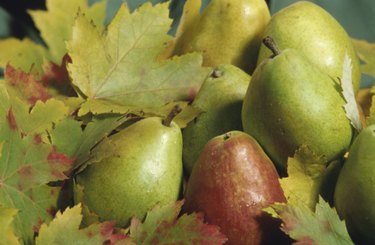
Many different varieties of pear trees are cultivated for fruit, but Bradford pear trees are commonly grown for their attractive, ornamental foliage. Pear tree leaves aren't just pretty; they serve an important function for the tree by absorbing sunlight and turning it into much-needed food. The leaves may also indicate when the pear tree is diseased or receiving too few of the nutrients it requires.
Growth
Video of the Day
Pear tree leaves often appear on the tree only after the white flowers have started to blossom. By the time the fruits grow as large as 1 inch in diameter, the leaves will be big enough to hide them from view. Bradford pear trees live for 25 to 30 years, growing 30 to 40 feet high with a spread just as wide. The leaf crown is symmetrical and roundish. Leaves grow thick and quickly on the tree in spring. In fall, they change from green to vivid red and begin to drop as the season matures. The leaves grow in an alternating pattern on the branches, rather than straight across from each other.
Video of the Day
Characteristics
The leaves of the Bradford pear are flat and simple, or lobe-less. The edges of the leaves are evenly serrated all the way around. Leaf bases are somewhat rounded and symmetrical. Leaves have a rounded or oval shape, growing less than 2 inches long and 2 to 4 inches wide. In spring and summer, the leaves are green.
Growing
The Bradford pear tree may be grown in USDA hardiness zones 5 through 9, though the tree is not native to North America. Bradford pear trees grow well in the ground or in containers and are often used in landscaping because of their relatively small size and attractive fall foliage. On the Bradford pear, it's the leaves and not the fruits that are the main attraction. Fruits of the Bradford pear tree are very small and do not grow with the classic pear shape.
Problems
Pear leaves may begin to turn yellow out of season, even browning and wilting off the tree. The symptoms may be an indication of iron deficiency, signaling that the tree isn't getting the nutrients it needs. Spray iron sulfate directly onto the leaves. If they begin to turn green again, you'll know the soil lacks iron. Apply fertilizer to reinvigorate the soil and provide the tree with what it needs.
- Ohio Public Library Information Network; Bradford Pear; 1997
- University of Florida IFAS Extension; Bradford Callery Pear; Edward F. Gilman, et al.
- New Mexico State University Cooperative Extension Service; Yellow Leaves on Bradford Pear Tree; May 24, 2003
- Delaware River Invasive Plant Partnership: Callery Pear